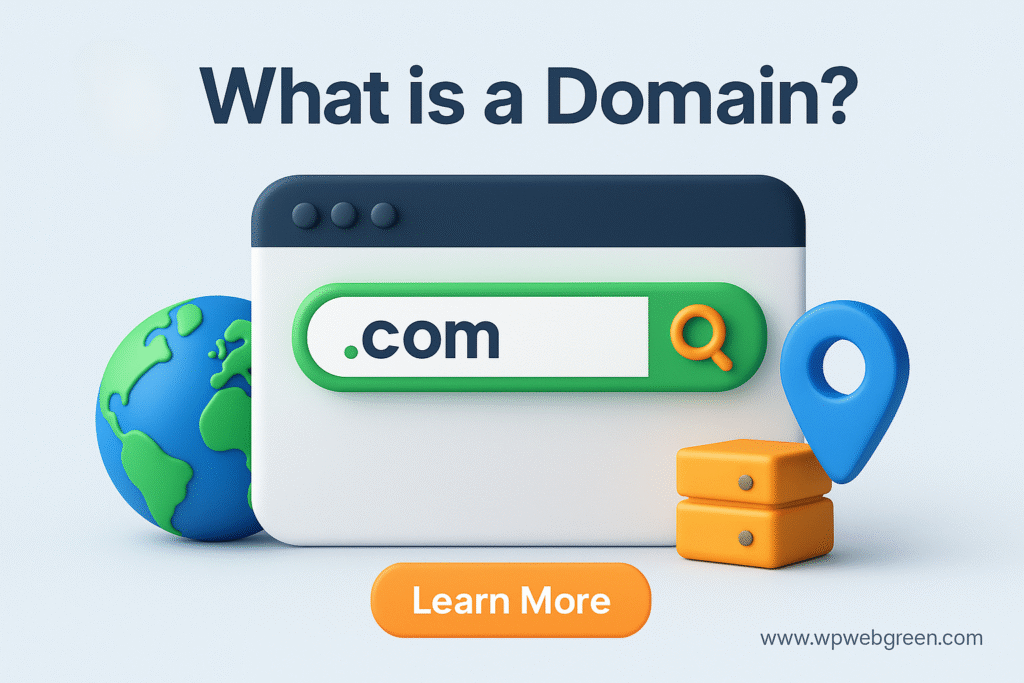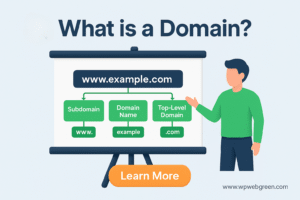What is a Domain? A Complete Guide to Understanding Domains
When you think of the internet, one of the first things that comes to mind is a website address something like “google.com” or “facebook.com.” But what exactly is a domain name, and why is it so important?
In this blog post, we’ll break down everything you need to know about domains, including:
-
What is a Domain Name?
-
How Do Domains Work?
-
Different Parts of a Domain Name
-
Types of Domain Names
-
How to Register a Domain Name
-
Domain Name vs. URL vs. Website
-
Why Are Domains Important?
-
Tips for Choosing the Perfect Domain Name
Let’s dive in!
1. What is a Domain Name?
A domain name is the address of a website that you type into your browser to visit it. Instead of remembering a complex series of numbers (IP addresses like 192.168.1.1.4), users can simply type a name like “amazon.com” to access a website.
Domains make the internet user-friendly by allowing businesses and individuals to establish a unique online identity.
2. How Do Domains Work?
When you enter a domain name (e.g., youtube.com) into your browser, here’s what happens behind the scenes:
-
Your browser sends a request to the Domain Name System (DNS) a global network of servers.
-
DNS translates the domain name into an IP address (the actual location of the website’s server).
-
Your browser connects to the server using the IP address and loads the website.
Without domains, we’d have to memorize long strings of numbers to visit websites making the internet much harder to use!
3. Different Parts of a Domain Name
A domain name consists of several parts. Let’s break down “www.example.com”:
-
Top-Level Domain (TLD) – .com (other examples: .org )
-
Second-Level Domain (SLD) – “example” (the unique name you choose)
-
Subdomain (optional) – “www” (other examples: blog.example.com, shop.example.com)
Some domains also have country-code TLDs (ccTLDs), like .uk (United Kingdom) or .ca (Canada).
4. Types of Domain Names
Domains come in different categories based on their purpose and extension:
A. Generic Top-Level Domains (gTLDs)
-
.com – Commercial websites (most popular)
-
.org – Organizations & nonprofits
-
.net – Network-related services
-
.io – Tech startups (popular in the tech industry)
B. Country-Code Top-Level Domains (ccTLDs)
-
.us – United States
-
.in – India
-
.de – Germany
C. Sponsored Top-Level Domains (sTLDs)
-
.edu – Educational institutions
-
.gov – Government websites
D. New Domain Extensions
-
.app – For apps
-
.blog – For bloggers
-
.ai – Artificial intelligence companies
5. How to Register or Buy a Domain Name
Registering a domain is simple:
-
Choose a domain registrar or a reseller (e.g., Wpwebgreen , Hostinger , Namecheap).
-
Search for your desired domain name (e.g., “mybusiness.com” or click here ).
-
Check availability – If taken, try variations or different extensions.
-
Purchase the domain (usually for 1-10 years).
-
Connect it to a hosting provider to make your website live.
Pro Tip: Buy multiple extensions (e.g., .com, .net) to protect your brand.
6. Domain Name vs. URL vs. Website
-
Domain Name – The website’s address (e.g., facebook.com).
-
URL (Uniform Resource Locator) – The full web address (e.g., https://www.facebook.com/login).
-
Website – The actual content (web pages, images, etc.) stored on a server.
7. Why Are Domains Important?
-
Brand Identity – A good domain strengthens your brand (e.g., Nike.com).
-
Credibility – A professional domain builds trust.
-
SEO Benefits – A keyword-rich domain can improve search rankings.
-
Email Professionalism – Having yourname@yourbusiness.com looks more professional than yourbusiness@gmail.com.
8. Tips for Choosing the Perfect Domain Name
Keep it short & memorable (e.g., Google.com, Amazon.com).
Use keywords (e.g., “BestPizzaNYC.com”).
Avoid numbers & hyphens (hard to remember & spell).
Choose the right extension (.com is best for businesses).
Check trademarks to avoid legal issues.
Final Thoughts
A domain name is your digital identity on the internet. Whether you’re starting a blog, an online store, or a business website, choosing the right domain is crucial for success.
Now that you understand domains, it’s time to buy your perfect domain name and build your online presence, Click here to buy your domain !



